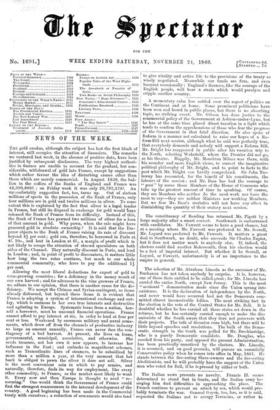A momentary calm has settled over the aspect of politics
on the Continent and at home. Some prominent politicians have been seen and heard in public places, but there is no absorbing topic, no striking event. Mr. Gibson has done justice to the commercial policy of the Government at Ashton-under-Lyne, but he has at the same time placed direct taxation in a light which tends to confirm the apprehensions of those who fear the progress of the Government in that fatal direction. He also spoke of Reform in a manner not calculated to raise our hopes of a Re- form4lill next session, although what he said was perfectly true, that everybody demands and nobody will support a Reform Bill. Mr. Bright has reappeared in public after his vacation trip to the North, selecting Wakefield, where the Premier did not go, as his theatre. Happily, Mr. Monckton Mikes was there, with his sounder and more English views, to correct the imaginative political philosophy of Mr. Bright, and to point to facts in the past which Mr. Bright can hardly comprehend. Sir John Tre- lawny has recounted, for the benefit of his constituents, the labours of the session ; and Mr. Bass has had the courage to " post" by name those Members of the House of Commons who take up the greatest amount of time in speaking. Of course, they are Members who neither do the most work nor have the most to say—they are neither Ministers nor working Members. But we fear Mr. Bass's statistics will not have any effect in diminishing the quantity of their oratory next session.


























